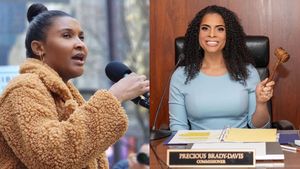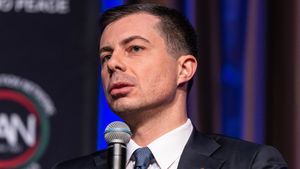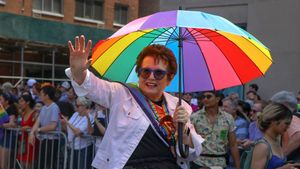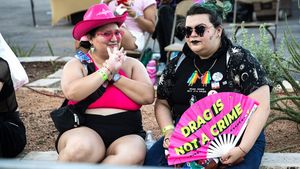All Rights reserved
By continuing to use our site, you agree to our Privacy Policy and Terms of Use.
Justin Vivian Bond--artist, songwriter, chanteuse--comes down from her East Village apartment to meet me. He is wearing a casual black ensemble and her soft hair is done in a
reddish tinted bob.
Him? Her? He? She? I've known Bond for nearly two decades, and have never felt like I had to classify her as one gender. But I have never written about him. Now here I am, assigned to profile the magnetic performer during the release of her debut album, Dendrophile, and suddenly the English language seems really narrow-minded. Fortunately, a note on Bond's website provides a guide:
PRONOUN: V
GENDER: TRANS OR T
FULL NAME: MX JUSTIN VIVIAN BOND
Defining Justin Bond's gender is no less difficult than figuring out what makes the 47-year-old performer's cabaret act so compelling. It can be hilarious, heart-wrenching, vulnerable, sardonic, Wiccan, and world-weary all at the same time.
Whether singing about the ancient gender-variant priests, the Galli, as Bond did in the 2010 show Re:Galli Blonde (A Sissy Fix), or performing as Kiki DuRane alongside Kenny Mellman's Herb as the tragic, washed-up lounge act Kiki and Herb, which launched them both into international notoriety, there is something powerfully both about the performer: masculine/feminine, mordant/fabulous, comic/tragic.
It's this energy that John Cameron Mitchell harnessed in his groundbreaking 2006 film Shortbus, in which Bond, playing Vself, made an appearance to sing 'In The End,' expressing in just one scene that heightened sense of simultaneous hope and despair in post'9/11 downtown New York City. A soft, acoustic reworking of the song appears on Dendrophile. Now there's a word that seems appropriate for describing Bond. 'It means a person who gets an erotic charge out of nature,' the artist explains, smoking, as we sit on mismatched furniture in the living room of V's worn-in, old-school East Village apartment on Second Avenue. Much of the art hanging on the walls is from friends, including the photographer Mr. Means, the artist Grant Shaffer, and the painter John Byrne, the husband of Bond's good friend Tilda Swinton.
Next to me a Joan Baez songbook rests on a scuffed-up piano that Bond bought, in a rush, one rainy night for $210. A bumper sticker taped up near the kitchen reads, NOBODY KNOWS I AM A TRANSSEXUAL. Nearby is a framed, autographed album, All the Sad Young Men by Anita O'Day, one of Bond's musical heroines. A sequined sign hanging on the front door reads house of whimsy in felt letters.
Nathan Carrera, a musician Bond describes as a 'traveling companion,' is slouched on the couch, quietly working on a set list for a guest DJ gig at the monthly queer night Mattachine later that month, and Nicholas Gorham, Bond's roommate, is reading in a chair. Their cat, Pearl, is poised on a stool in one of those Elizabethan collars. 'She has a hotspot on her stomach that she can't stop licking,' says Bond. 'She is obsessed with overgrooming. I don't know where she gets that from.'
Dendrophile, which was recorded in Brooklyn and Manhattan and produced by Bond's frequent music director, Thomas Bartlett, has a minimalist quality that highlights Bond's cello-warm voice, and includes covers of notable songs like Joni Mitchell's 'Court and Spark,' obscurities like Bambi Lake's 'The Golden Age of Hustlers,' and some striking, soul-baring originals like 'Equipoise.'
It's a long-overdue collection that, paradoxically, couldn't have been produced until now, a record of personal transformation--from callow youth growing up in suburban Maryland to dynamic performer, from self-confusion to self-acceptance, from unawareness to understanding.
Tilda Swinton recalls introducing 'a longhaired, nail-varnished, impeccable, treacle-voiced Justin,' to her 4-year-old daughter. 'My daughter asked me, 'Is Justin a man or a lady?' Before I could speak, she answered herself, 'Oh, it doesn't matter.' '
For Swinton, Bond is the 'mutha of all muthas,' to use an appellation she coined while introducing V at Joe's Pub in New York City last year. 'It suddenly occurred to me that not only Kiki but also Justin are great mother figures to those that know them: all-embracing, all-seeing, all-knowing, unshakable, unconditionally present.'
Jake Shears, lead singer of the Scissor Sisters, agrees. 'Justin is one of the great New York performers, and has had a massive influence on downtown culture,' he says. When Shears first moved to New York it was a Kiki and Herb Christmas show that inspired him to launch his own musical career. 'This lightbulb went off in my head and really gave me a thirst for wanting to perform myself. I'll never forget that moment.' Bond would later invite the Scissor Sisters to support Kiki and Herb at New York's Knitting Factory. When the band's first album went platinum in the United Kingdom, Shears returned the favor, and Kiki and Herb supported the Sisters on their first big tour.
Bond grew up in Hagerstown, Md., on the edge of the suburbs, 'where you could walk out of the house and be in the woods.' V has a sister, four years younger. 'I hated her,' Bond says, only half joking. 'She got everything I wanted. Clothing, Barbies. She could stay with her girlfriends at sleepovers and I had to go home.'
At age 11, Bond had a sexual relationship with a neighborhood boy of the same age that lasted until they were 16. 'I didn't know we were fucking at 13--I just wanted to see if it fit in my butthole,' Bond says. 'It was not at all some kind of fantasy relationship. It was painful. We didn't like each other, but we couldn't stop. After that I realized I was never going to have sex with someone I didn't care about. Ever.' Bond is releasing a memoir in September, Tango: My Childhood Backwards and in High Heels (published by the Feminist Press).
The performer describes being 'invisible' in high school--a common survival tactic for anyone who doesn't fit into the sexual normalcy of suburban America. Ironically, it was the local church, the Church of the Brethren, that ended up being a creative outlet, where Bond sang in the youth choir and reenacted Gilda Radner routines for classmates at Sunday school.
Later, Bond joined the Potomac Play-makers community theater, performing in Brigadoon, Kiss Me Kate, and playing Kurt in The Sound of Music. V's parents were 'actually super cool about me performing,' despite being ill-equipped to understand their child's differences. They arranged for Bond's voice lessons, beginning at 13. 'I love singing. My only well-developed muscle is my voice.'
After graduation, Bond attended Adelphi University in Long Island, pursuing a theater degree, which proved to be limiting in a different way. 'That school was about getting on soap operas.' V often heard homophobic remarks, 'like 'You'll never get a job--you've got to be more butch.' '
After graduating college in 1985, Bond moved into the city. 'My first job in New York was scrubbing walls for Details magazine. I had Jack Wagner hair, Fiorucci jeans. I basically dressed like a preppy lesbian.' A friend worked at Studio 54, and Bond frequented the club, oddly avoiding the downtown queer creative scene that would eventually become home.
Bond has been living in the East Village on and off since 1994, and has been in this apartment for four years--but alas, not for much longer. The building has been bought by developers who will be razing the property and building luxury condos. 'I hope we can find someplace affordable. I don't want to leave the East Village,' Bond says with a notable absence of anger.
There are memories, talismans, signs, and miniature altars everywhere. On a shelf of treasured objects, Bond points out an old gin bottle that may have belonged to Edna St. Vincent Millay, a dog bone signed by William Burroughs, and a familiar hat that belonged to Edie Sedgwick, which inspired Bob Dylan to write the song 'Leopard-Skin Pillbox Hat.' All were given as gifts to Bond over the years.
Close by, in a small bedroom, opposite a hilariously ornate gold-painted vanity, are two photo-collage dream catchers--one of Jean Genet and the other of Joan Didion--made by the costume designer and performer Machine Dazzle. O'Day, Sedgwick, Burroughs, Millay'Bond's home is full of personalities'people who were unforgettably themselves, impossible to reproduce, all both tragic and hopeful. The environment seems like an oasis for originality. Outside is the encroaching luxury condoland; here is a house of whimsy.
I met Bond in the late '90s, as both of us rambled around the East Village queer scene, but the first time I ever saw V was at a panel in 1992 at the National Gay and Lesbian Task Force's Creating Change conference in Los Angeles. The focus was on cross-dressing or transgender awareness (neither of us can remember exactly), and Bond, who was speaking there, wore light daytime makeup, fitted jeans, and a red scoop-neck sweater with a matching hair band. I thought V was one of the most androgynous, naturally beautiful creatures I had ever seen. 'That was just the beginning,' Bond laughs when I summon the memory. 'That person you saw was so insecure.'
Three years earlier, in 1989, Bond had moved to San Francisco, where the artist found a job at A Different Light bookstore, became a member of Queer Nation, and performed in plays. It was in San Francisco that Bond met Kate Bornstein, the performance artist, author, and gender theorist known for her books that challenge gender stereotypes and the assumption that all trans women are women trapped in men's bodies. Bornstein invited Bond to join the cast of her autobiographical play Hidden A: Gender, which ran at the Alice B. theater in Seattle in 1990 as a part of an international gay and lesbian theater festival.
In 1990, Bond started working with the musician Kenny Mellman. They started playing in San Francisco clubs as Kenny and Justin, doing alternative rock songs in a lounge style, but Kiki was slowly moving into view'a drunk, over-the -hill lounge singer that Bond would officially introduce in 1993. 'One night we were supposed to play Caf' Du Nord, and had been screaming all day at the gay pride parade. I said 'Tonight I can't sing, so you will be Herb, and I'll do Kiki.' We got a standing O. I thought, Jeez, I don't have to look good or sound good to do this character, so let's keep doing it.'
Their performance style was raw, alcoholic, and full of rage and comedy. Kiki would screech, break glasses, hit herself in the head with the mic, sing medleys that spanned from Meatloaf to Patti Smith--to hilarious and tragic extremes.
In the beginning, this kind of theatrical freedom was assisted by hallucinogens. 'Kenny and I would eat mushrooms in the cab on the way over to the gig.' But from the experience, Bond's improvisational skills were honed and tuned. 'It was such an education'creating such a specific character and knowing it so well. I was in Jungian analysis at the time, learning about tapping into your subconscious mind. And my mind was stimulated by mushrooms, too.' For Bond, it was a major lesson in stage presence: 'Trust yourself and own yourself and do it with conviction.'
To this day, Bond's stage timing can seem almost balletic in its precision. 'Nobody is better than Justin at taking the tragedies, failures, and obnoxious distractions of a live performance and using them to the benefit of all around,' says the performer Taylor Mac, who remembers such a moment, recently, at Joe's Pub. Bond was finishing a ballad, singing the last note, and in the audience, a plate dropped and shattered, distracting the audience. 'Our master of the moment leans over into the audience, picks up a plate from someone else's table and smashes it on the stage. The audience bursts into applause.'
'To me Justin Bond represents one of the last manifestations of the fully realized, unmediated, downtown artist,' says performance artist Penny Arcade. 'This is partly the result of Justin's position at the end of the Baby Boomer generation and the inherent values that still informed the culture then. And [it's partly] Justin's having come of age in the first decade of the AIDS plague but before the sinking of Atlantis, when one could still experience the great, raw, flamboyant and uniquely intellectual beauty of the gay world of yesterday.'
In 1994, Bond moved back to New York City, this time with Mellmann. Kiki and Herb first performed at the now-defunct cabaret bar 88's in the West Village, then on Sunday nights in the side room at Cowgirl Hall of Fame, then, soon, all over downtown. Bond hadn't really set on Kiki being such a phenomenon, but it struck a chord. 'Kiki came out of grief, a character I developed out of everyone dying in San Francisco. I think I was deeply traumatized by loss and created a character that expressed vulnerability and pain. Just when I was about to stop, September 11 happened.' The show eventually made it to Carnegie Hall in 2004, and then a five-week run on Broadway in 2006, where it was nominated for a Tony Award.
Craving an escape from the character and the attention surrounding her, Bond moved to London to attend Central Saint Martin's College for scenography--a program designed to break down the traditional hierarchies of theater. V lived in the London Bridge area and above a hepatitis clinic. 'It was where addicts would apply for a liver transplant. When I had a hangover some mornings, I would scream out the window, 'Put me on the list!' '
Bond returned to New York in 2006, and last performed as Kiki in 2008. Three years on, Bond is a solo star, performing a series of sold-out shows, developing songs that appear on the album. (The theater critic Hilton Als, in The New Yorker, called Bond the 'best cabaret singer of his generation' after a recent run at Joe's Pub.)
Bond now sings and performs with a more powerful, earthy quality, and the time away from New York, from Kiki, has given V a chance to tap into deeper archetypes and mythology. In retrospect, Bond appreciates the tutelage of Kiki. 'If I hadn't done Kiki I wouldn't have the voice I have now,' but 'Equipoise,' an original song on the album, is strikingly revealing. Over a bouncy bluegrass melody, Bond sings, 'And I sought to find forgiveness, for letting everybody down/ For not being what they'd hoped I'd be, turned myself into a clown/ And I tried to make the people smile, and tried to ease the pain of life/ And I tried to take the easy way, tried to be a perfect wife.'
Is this a reference to the Kiki years? Yes, Bond agrees, 'To deal with homophobia and transphobia, I became Kiki.' But it went deeper. 'When I grew up the only way I learned how to survive was to be funny. I was my mom's most glamorous accessory, and my mother's greatest embarrassment. I thought I was a trans woman and that I had to go get an operation. I thought you either had to be one or the other, and I didn't realize until much later that you could be neither or both.'
For Shears, witnessing Bond's the evolution has been no less gratifying. 'Every time I see Justin, especially recently, I see someone who is more comfortable, more glowing. He was always comfortable in his skin, but now he's going into a new dimension, and it's lovely and exciting to watch.'
Recently, Bond has decided to begin transitioning. V will not behaving any surgery. It's more on an enhancement process. 'I like my penis, and I am keeping it, but I am creating a transbody --a physical record on my body and a medical record that I am a transgendered person. I am turned on by people who are genuinely themselves. That's what dendrophile means. Having my own nature. I guess I have realized it's not nature versus nurture. It's nurturing your nature.'
Justin Vivian Bond will be performing every Sunday in May at Joe's Pub in New York City and then at the Soho Theatre in London the last two weeks of June.






































































